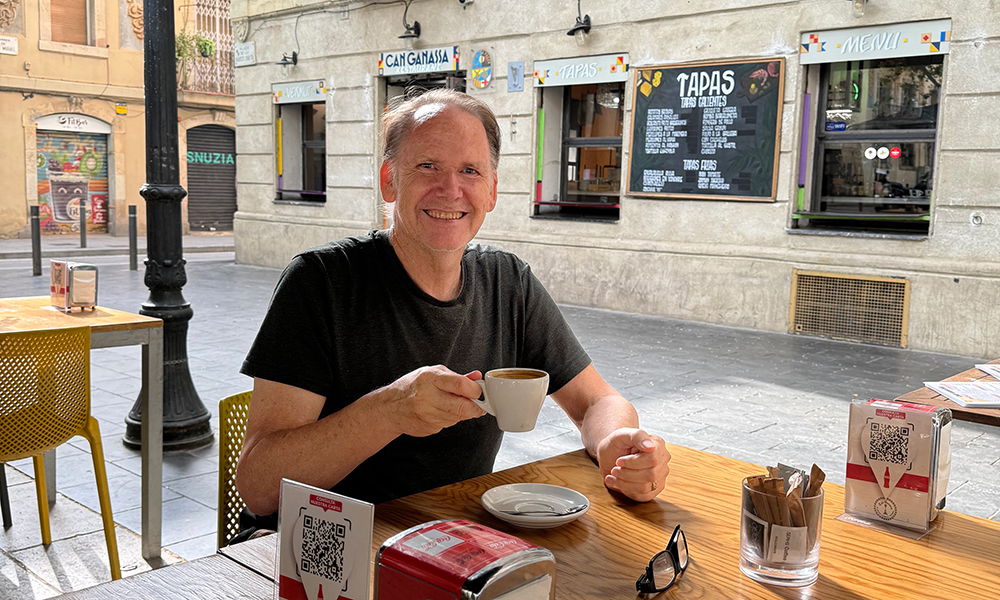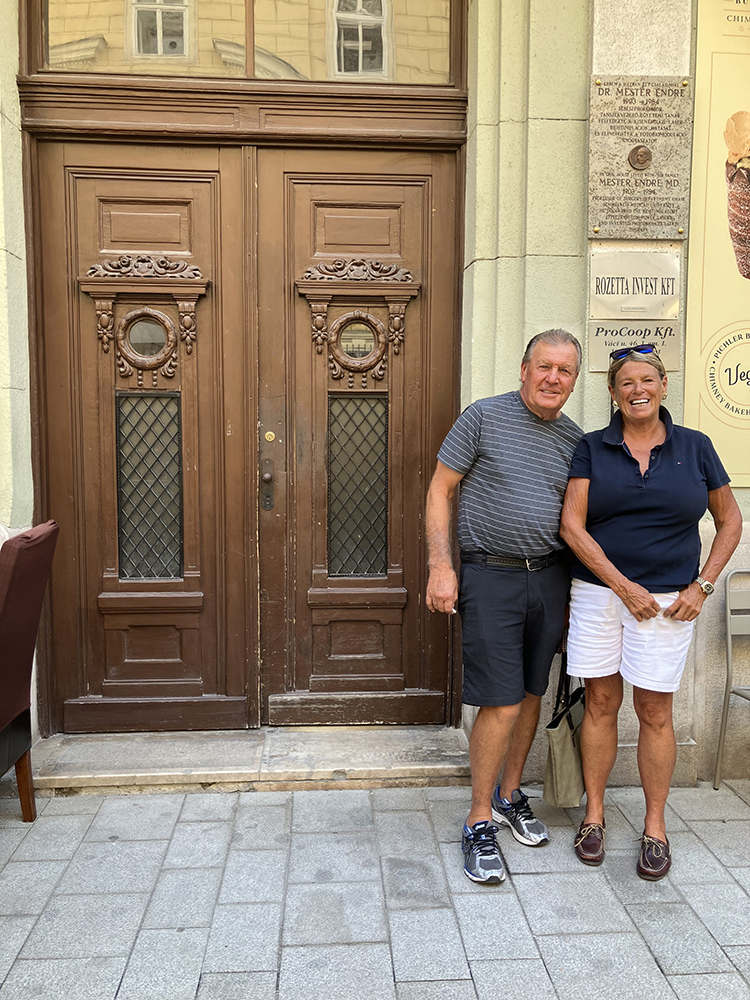
2011年,從事計(jì)算機(jī)科學(xué)工作的艾倫·福西特決定退休,。當(dāng)時(shí),,他確信自己希望至少拿出幾年時(shí)間去旅行,尤其是環(huán)游歐洲,。正如他所說(shuō)的那樣,,在科技行業(yè)工作了數(shù)十年之后,他已經(jīng)準(zhǔn)備讓自己的大腦放松一下,。他對(duì)《財(cái)富》雜志表示:“計(jì)算機(jī)編程毀了我的大腦,。我需要逃離這種生活?!?/p>
他沒(méi)想到的是,,這次逃離變成了永久的離開(kāi)。他退休后不久就遇到了現(xiàn)在的妻子伊麗莎白,,并最終與妻子一起定居西班牙,。
現(xiàn)年67歲的福西特通過(guò)結(jié)婚獲得了西班牙居民身份。他對(duì)自己的決定感到無(wú)比開(kāi)心,。雖然妻子仍在工作,,但他每天都與巴塞羅那的外國(guó)朋友一起打網(wǎng)球、讀書(shū),、去海灘或咖啡館,。他和妻子可以在歐洲大陸旅行,甚至計(jì)劃今年去巴黎觀看奧運(yùn)會(huì),。
福西特表示,,在美國(guó)不可能過(guò)上這種生活。西班牙的房?jī)r(jià)更低,,食物不貴,,而且葡萄酒更便宜。西班牙的公共交通系統(tǒng)簡(jiǎn)直是天賜之物,;福西特沒(méi)有汽車(chē),,而且出行也不需要開(kāi)車(chē)。步行便利性是一個(gè)重要的好處,。
福西特表示:“在這里生活很幸福,。你在任何地方都能戶(hù)外用餐,這里氣候宜人,,而且所有商品都很便宜,?!备N魈卦?019年獲得居民身份。
福西特代表了美國(guó)退休人群在退休危機(jī)刺激下出現(xiàn)的一種日益流行的趨勢(shì),,這些退休人員搬到海外生活,,而不是在美國(guó)度過(guò)晚年。根據(jù)美國(guó)社會(huì)保障局(Social Security Administration)最近公開(kāi)的數(shù)據(jù),,2022年12月,,在海外領(lǐng)取社會(huì)保障金的人數(shù)超過(guò)700,800人。2000年,,這個(gè)數(shù)字還不足400,000人,。
一些人搬到海外的原因是,美國(guó)的住房和醫(yī)療成本變得越來(lái)越令人難以承受,,因此依靠固定退休收入無(wú)法過(guò)上舒適的生活,。在美國(guó),有大批退休人員幾乎完全依賴(lài)社會(huì)保障金維持生計(jì),,每個(gè)月的平均社會(huì)保障金約為1,900美元,。越來(lái)越多的美國(guó)老年人生活貧困,即使他們能獲得社會(huì)服務(wù),,這類(lèi)服務(wù)也少之又少,。
有人一直夢(mèng)想去旅行,沉浸式體驗(yàn)其他文化,。還有人雖然有能力繼續(xù)留在美國(guó)生活,但他們意識(shí)到如果在海外生活,,他們的錢(qián)更有購(gòu)買(mǎi)力,。
“不必付出什么代價(jià)”
蘇珊·基南·斯威尼和丈夫喬就屬于后者。他們?cè)?015年搬到了匈牙利(喬出生在匈牙利,,但童年時(shí)就搬離了這個(gè)國(guó)家),。69歲的斯威尼在美國(guó)從事銀行業(yè)軟件工作,成績(jī)斐然,,她甚至在佛羅里達(dá)州提前退休,。但日益升高的住宅和醫(yī)療成本,讓她推遲了退休時(shí)間,。
在搬到匈牙利之前,,她和丈夫曾游覽過(guò)這個(gè)國(guó)家。在看到當(dāng)?shù)氐牡蜕畛杀竞透徛纳罟?jié)奏后,,他們幾乎“沖動(dòng)地”決定搬家?,F(xiàn)在他們有一套在鄉(xiāng)村的房子,距離布達(dá)佩斯約兩個(gè)小時(shí)車(chē)程,,房子周?chē)瞧咸褕@,。斯威尼在這里從事園藝,,在附近的市場(chǎng)購(gòu)買(mǎi)時(shí)令新鮮農(nóng)產(chǎn)品,在家里制作果醬和果凍,;夫妻二人會(huì)到西班牙過(guò)冬,,其他時(shí)間則周游歐洲。

斯威尼還提到四通八達(dá)的公共交通系統(tǒng)是匈牙利的一大優(yōu)勢(shì)——65歲以上可免費(fèi)乘坐公共交通,,而且在他們生活的山腳下就有一座火車(chē)站。此外,,他們?cè)谶@里有安全感和社區(qū)感,。斯威尼表示,與佛羅里達(dá)相比,,他們?cè)谶@里每年可以節(jié)省數(shù)千美元房產(chǎn)稅,,而且外籍人士醫(yī)療保險(xiǎn)遠(yuǎn)低于美國(guó)的醫(yī)療保險(xiǎn)成本。他們每個(gè)月最大的一筆支出是美國(guó)Hulu訂閱費(fèi),。他們通過(guò)VPN可以觀看Hulu的節(jié)目,。
斯威尼說(shuō)道:“在退休地點(diǎn)方面,我想我已經(jīng)走在了最前沿,。我們?cè)谶@里生活不必付出什么代價(jià),。”
在海外生活的權(quán)衡
當(dāng)然,,在海外生活也有一些缺點(diǎn),。斯威尼的其他家人都在美國(guó),因此他們需要計(jì)劃探望家人的旅行,。至少在最初很難克服文化差異,,而且斯威尼仍在學(xué)習(xí)一些基礎(chǔ)的匈牙利語(yǔ)。福西特指出,,西班牙人的個(gè)人財(cái)富水平不及美國(guó),;西班牙普遍的工資水平遠(yuǎn)低于在美國(guó)能找到的六位數(shù)薪酬。當(dāng)然,,西班牙的所得稅率更高,。
斯威尼和福西特如果是在歐洲工作,他們可能無(wú)法攢到在美國(guó)從事高薪職業(yè)所攢下的財(cái)富,。他們的大多數(shù)投資依舊在美國(guó)的金融機(jī)構(gòu),,因?yàn)檫@些資金很難轉(zhuǎn)移。搬到海外還有其他官僚手續(xù)和繁文縟節(jié),。斯威尼和丈夫聘請(qǐng)了一位律師幫助他們買(mǎi)房,。
福西特表示:“我們?cè)谇皟赡曛饕翘幚砉倭攀掷m(xù)。在西班牙,,你做任何事情都要面對(duì)大量文書(shū)工作,?!?/p>
但福西特表示,更多人在西班牙的生活水準(zhǔn)高于在美國(guó)的生活,。在西班牙生活的好處體現(xiàn)在一些小的地方,。例如在西班牙更容易買(mǎi)到更新鮮、更便宜的食品雜貨和音樂(lè)會(huì)門(mén)票,。還有一些更大的福利,,例如長(zhǎng)達(dá)數(shù)月的帶薪產(chǎn)假、廉價(jià)的中等教育和經(jīng)濟(jì)實(shí)惠的醫(yī)療成本等,。

斯威尼表示:“這里與美國(guó)截然不同,。人們的行事方式截然不同,,所以我們才會(huì)搬到這里?!?/p>
雖然匈牙利和西班牙的全民醫(yī)療保健系統(tǒng)因?yàn)槁L(zhǎng)的等待時(shí)間而遭到詬病,,而且與美國(guó)相比醫(yī)療水平可能較低,但福西特和斯威尼對(duì)他們接受的醫(yī)療服務(wù)標(biāo)準(zhǔn)感到滿(mǎn)意,,包括外科手術(shù)和結(jié)腸鏡檢查等大型手術(shù),。有一個(gè)缺點(diǎn)是,許多醫(yī)療服務(wù)人員不會(huì)說(shuō)英語(yǔ),;斯威尼表示由于語(yǔ)言障礙,,如果有重大疾病,他們會(huì)考慮飛回美國(guó)接受治療,。
說(shuō)到文化沖擊,,斯威尼表示:“如果你作為美國(guó)人走進(jìn)當(dāng)?shù)蒯t(yī)生的診所,你可能大感意外,。在這里不必跟保險(xiǎn)公司打交道。你走進(jìn)診所,,看醫(yī)生,,然后離開(kāi)?!?/p>
Betterment公司的投資總監(jiān)明迪·于提醒那些有意在海外退休的人們,,要拿出時(shí)間制定計(jì)劃,以應(yīng)對(duì)在財(cái)務(wù),、法律和后勤方面的巨大隱患,。
于表示:“關(guān)鍵是要避免將海外退休視為成本更低的選擇,而是盡早開(kāi)始儲(chǔ)蓄,,同時(shí)分散投資組合以規(guī)避風(fēng)險(xiǎn),。咨詢(xún)具有國(guó)際專(zhuān)業(yè)知識(shí)的稅務(wù)專(zhuān)家至關(guān)重要,,因?yàn)樵趪?guó)外生活也可能讓你在美國(guó)和新的居住國(guó)承擔(dān)新的稅務(wù)義務(wù)?!?/p>
福西特計(jì)劃與妻子留在西班牙,,特別是因?yàn)槠拮右疹?1歲的母親,她的子女也在當(dāng)?shù)亻L(zhǎng)大成人,。斯威尼也表示,,她和丈夫長(zhǎng)期住在匈牙利,但他們最終可能從葡萄園搬到布達(dá)佩斯,。
斯威尼表示:“我建議任何人搬到國(guó)外前,,去國(guó)外度假,租一套房子,,四處游覽一番,。你會(huì)發(fā)現(xiàn)自己來(lái)到了一些做夢(mèng)都想不到的地方。如果你已經(jīng)退休,,又有幾個(gè)月的時(shí)間,,為什么不嘗試一下?”(財(cái)富中文網(wǎng))
翻譯:劉進(jìn)龍
審校:汪皓
2011年,,從事計(jì)算機(jī)科學(xué)工作的艾倫·福西特決定退休,。當(dāng)時(shí),他確信自己希望至少拿出幾年時(shí)間去旅行,,尤其是環(huán)游歐洲,。正如他所說(shuō)的那樣,在科技行業(yè)工作了數(shù)十年之后,,他已經(jīng)準(zhǔn)備讓自己的大腦放松一下,。他對(duì)《財(cái)富》雜志表示:“計(jì)算機(jī)編程毀了我的大腦。我需要逃離這種生活,?!?/p>
他沒(méi)想到的是,這次逃離變成了永久的離開(kāi),。他退休后不久就遇到了現(xiàn)在的妻子伊麗莎白,,并最終與妻子一起定居西班牙。
現(xiàn)年67歲的福西特通過(guò)結(jié)婚獲得了西班牙居民身份,。他對(duì)自己的決定感到無(wú)比開(kāi)心,。雖然妻子仍在工作,但他每天都與巴塞羅那的外國(guó)朋友一起打網(wǎng)球,、讀書(shū),、去海灘或咖啡館。他和妻子可以在歐洲大陸旅行,,甚至計(jì)劃今年去巴黎觀看奧運(yùn)會(huì),。
福西特表示,,在美國(guó)不可能過(guò)上這種生活。西班牙的房?jī)r(jià)更低,,食物不貴,,而且葡萄酒更便宜。西班牙的公共交通系統(tǒng)簡(jiǎn)直是天賜之物,;福西特沒(méi)有汽車(chē),,而且出行也不需要開(kāi)車(chē)。步行便利性是一個(gè)重要的好處,。
福西特表示:“在這里生活很幸福,。你在任何地方都能戶(hù)外用餐,這里氣候宜人,,而且所有商品都很便宜,。”福西特在2019年獲得居民身份,。
福西特代表了美國(guó)退休人群在退休危機(jī)刺激下出現(xiàn)的一種日益流行的趨勢(shì),,這些退休人員搬到海外生活,而不是在美國(guó)度過(guò)晚年,。根據(jù)美國(guó)社會(huì)保障局(Social Security Administration)最近公開(kāi)的數(shù)據(jù),,2022年12月,在海外領(lǐng)取社會(huì)保障金的人數(shù)超過(guò)700,800人,。2000年,,這個(gè)數(shù)字還不足400,000人。
一些人搬到海外的原因是,,美國(guó)的住房和醫(yī)療成本變得越來(lái)越令人難以承受,,因此依靠固定退休收入無(wú)法過(guò)上舒適的生活。在美國(guó),,有大批退休人員幾乎完全依賴(lài)社會(huì)保障金維持生計(jì),,每個(gè)月的平均社會(huì)保障金約為1,900美元。越來(lái)越多的美國(guó)老年人生活貧困,,即使他們能獲得社會(huì)服務(wù),,這類(lèi)服務(wù)也少之又少。
有人一直夢(mèng)想去旅行,,沉浸式體驗(yàn)其他文化。還有人雖然有能力繼續(xù)留在美國(guó)生活,,但他們意識(shí)到如果在海外生活,,他們的錢(qián)更有購(gòu)買(mǎi)力。
“不必付出什么代價(jià)”
蘇珊·基南·斯威尼和丈夫喬就屬于后者,。他們?cè)?015年搬到了匈牙利(喬出生在匈牙利,,但童年時(shí)就搬離了這個(gè)國(guó)家),。69歲的斯威尼在美國(guó)從事銀行業(yè)軟件工作,成績(jī)斐然,,她甚至在佛羅里達(dá)州提前退休,。但日益升高的住宅和醫(yī)療成本,讓她推遲了退休時(shí)間,。
在搬到匈牙利之前,,她和丈夫曾游覽過(guò)這個(gè)國(guó)家。在看到當(dāng)?shù)氐牡蜕畛杀竞透徛纳罟?jié)奏后,,他們幾乎“沖動(dòng)地”決定搬家?,F(xiàn)在他們有一套在鄉(xiāng)村的房子,距離布達(dá)佩斯約兩個(gè)小時(shí)車(chē)程,,房子周?chē)瞧咸褕@,。斯威尼在這里從事園藝,在附近的市場(chǎng)購(gòu)買(mǎi)時(shí)令新鮮農(nóng)產(chǎn)品,,在家里制作果醬和果凍,;夫妻二人會(huì)到西班牙過(guò)冬,其他時(shí)間則周游歐洲,。
斯威尼還提到四通八達(dá)的公共交通系統(tǒng)是匈牙利的一大優(yōu)勢(shì)——65歲以上可免費(fèi)乘坐公共交通,,而且在他們生活的山腳下就有一座火車(chē)站。此外,,他們?cè)谶@里有安全感和社區(qū)感,。斯威尼表示,與佛羅里達(dá)相比,,他們?cè)谶@里每年可以節(jié)省數(shù)千美元房產(chǎn)稅,,而且外籍人士醫(yī)療保險(xiǎn)遠(yuǎn)低于美國(guó)的醫(yī)療保險(xiǎn)成本。他們每個(gè)月最大的一筆支出是美國(guó)Hulu訂閱費(fèi),。他們通過(guò)VPN可以觀看Hulu的節(jié)目,。
斯威尼說(shuō)道:“在退休地點(diǎn)方面,我想我已經(jīng)走在了最前沿,。我們?cè)谶@里生活不必付出什么代價(jià),。”
在海外生活的權(quán)衡
當(dāng)然,,在海外生活也有一些缺點(diǎn),。斯威尼的其他家人都在美國(guó),因此他們需要計(jì)劃探望家人的旅行,。至少在最初很難克服文化差異,,而且斯威尼仍在學(xué)習(xí)一些基礎(chǔ)的匈牙利語(yǔ)。福西特指出,西班牙人的個(gè)人財(cái)富水平不及美國(guó),;西班牙普遍的工資水平遠(yuǎn)低于在美國(guó)能找到的六位數(shù)薪酬,。當(dāng)然,西班牙的所得稅率更高,。
斯威尼和福西特如果是在歐洲工作,,他們可能無(wú)法攢到在美國(guó)從事高薪職業(yè)所攢下的財(cái)富。他們的大多數(shù)投資依舊在美國(guó)的金融機(jī)構(gòu),,因?yàn)檫@些資金很難轉(zhuǎn)移,。搬到海外還有其他官僚手續(xù)和繁文縟節(jié)。斯威尼和丈夫聘請(qǐng)了一位律師幫助他們買(mǎi)房,。
福西特表示:“我們?cè)谇皟赡曛饕翘幚砉倭攀掷m(xù),。在西班牙,你做任何事情都要面對(duì)大量文書(shū)工作,?!?/p>
但福西特表示,更多人在西班牙的生活水準(zhǔn)高于在美國(guó)的生活,。在西班牙生活的好處體現(xiàn)在一些小的地方,。例如在西班牙更容易買(mǎi)到更新鮮、更便宜的食品雜貨和音樂(lè)會(huì)門(mén)票,。還有一些更大的福利,,例如長(zhǎng)達(dá)數(shù)月的帶薪產(chǎn)假、廉價(jià)的中等教育和經(jīng)濟(jì)實(shí)惠的醫(yī)療成本等,。
斯威尼表示:“這里與美國(guó)截然不同,。人們的行事方式截然不同,所以我們才會(huì)搬到這里,?!?/p>
雖然匈牙利和西班牙的全民醫(yī)療保健系統(tǒng)因?yàn)槁L(zhǎng)的等待時(shí)間而遭到詬病,而且與美國(guó)相比醫(yī)療水平可能較低,,但福西特和斯威尼對(duì)他們接受的醫(yī)療服務(wù)標(biāo)準(zhǔn)感到滿(mǎn)意,,包括外科手術(shù)和結(jié)腸鏡檢查等大型手術(shù)。有一個(gè)缺點(diǎn)是,,許多醫(yī)療服務(wù)人員不會(huì)說(shuō)英語(yǔ),;斯威尼表示由于語(yǔ)言障礙,如果有重大疾病,,他們會(huì)考慮飛回美國(guó)接受治療,。
說(shuō)到文化沖擊,斯威尼表示:“如果你作為美國(guó)人走進(jìn)當(dāng)?shù)蒯t(yī)生的診所,,你可能大感意外,。在這里不必跟保險(xiǎn)公司打交道,。你走進(jìn)診所,看醫(yī)生,,然后離開(kāi)?!?/p>
Betterment公司的投資總監(jiān)明迪·于提醒那些有意在海外退休的人們,,要拿出時(shí)間制定計(jì)劃,以應(yīng)對(duì)在財(cái)務(wù),、法律和后勤方面的巨大隱患,。
于表示:“關(guān)鍵是要避免將海外退休視為成本更低的選擇,而是盡早開(kāi)始儲(chǔ)蓄,,同時(shí)分散投資組合以規(guī)避風(fēng)險(xiǎn),。咨詢(xún)具有國(guó)際專(zhuān)業(yè)知識(shí)的稅務(wù)專(zhuān)家至關(guān)重要,因?yàn)樵趪?guó)外生活也可能讓你在美國(guó)和新的居住國(guó)承擔(dān)新的稅務(wù)義務(wù),?!?/p>
福西特計(jì)劃與妻子留在西班牙,特別是因?yàn)槠拮右疹?1歲的母親,,她的子女也在當(dāng)?shù)亻L(zhǎng)大成人,。斯威尼也表示,她和丈夫長(zhǎng)期住在匈牙利,,但他們最終可能從葡萄園搬到布達(dá)佩斯,。
斯威尼表示:“我建議任何人搬到國(guó)外前,去國(guó)外度假,,租一套房子,,四處游覽一番。你會(huì)發(fā)現(xiàn)自己來(lái)到了一些做夢(mèng)都想不到的地方,。如果你已經(jīng)退休,,又有幾個(gè)月的時(shí)間,為什么不嘗試一下,?”(財(cái)富中文網(wǎng))
翻譯:劉進(jìn)龍
審校:汪皓
When Allan Fawcett decided to retire from his career in computer science in 2011, he knew he wanted to spend at least a few years traveling, particularly around Europe. After decades working in tech, he was ready, as he says, to give his mind a rest. “Computer programming destroyed my brain,” he tells Fortune. “I needed an escape.”
What he didn’t know is that that escape would become permanent. He met his now-wife, Elisabeth, shortly after he retired, and eventually took the leap to move permanently to Spain with her.
Fawcett, now 67 and a Spanish resident through marriage, couldn’t be happier about his decision. Though his wife still works, he spends his days playing tennis, reading, and going to the beach or cafés with expat friends in Barcelona. He and his wife are able to travel around the continent, even planning a trip to Paris for the Olympics this year.
The same lifestyle wouldn’t be possible in the U.S., Fawcett says. Housing is much more affordable, food is inexpensive, and the wine is even less so. The mass transit system is a godsend; Fawcett doesn’t have a car and doesn’t need one to get around. Walkability is also a major benefit.
“It’s a good life here,” says Fawcett, who became a resident in 2019. “Outdoor dining is everywhere, the weather is amazing. Everything is very cheap.”
Fawcett is part of a growing trend of retirees, spurred by America’s retirement crisis, who are moving abroad instead of spending their golden years in the U.S. In December 2022, there were over 700,800 people receiving Social Security payments abroad, according to the most recently available data from the Social Security Administration. In 2000, that figure was less than 400,000.
Some move abroad because they simply cannot comfortably live on a fixed retirement income in the U.S., where the costs of housing and healthcare, especially, are becoming increasingly unaffordable. A substantial number of retirees rely almost completely on Social Security payments to make ends meet in the U.S., which average around $1,900 per month. A growing portion of elderly Americans live in poverty, with social services few and far between, if they are accessible at all.
Others always dreamed of travel and immersing themselves in other cultures. And still others could afford to stay in the U.S. but realized how much more they could get for their money abroad.
‘It costs us next to nothing’
The latter is true for Susan Keenan Sweeney and her husband, Joe, who moved to Hungary in 2015 (Joe was born in Hungary, but moved away as a child). Though Sweeney, 69, had done well for herself in a career in banking software in the states and even retired early in Florida, she was put off by the increasingly high costs of housing and health care.
When she and her husband visited Hungary before the move, they looked at the affordable cost of living and slower pace of life and decided, almost “on a whim,” to move. They now own a home in the countryside, about two hours outside of Budapest, surrounded by vineyards. Sweeney gardens and revels in the seasonal fresh produce that’s available at the nearby market, making jams and jellies at home; the couple spends their winters in Spain, and travels extensively around Europe the rest of the year.
Susan Keenan Sweeney and her husband, Joe Horvath, in Budapest.
Sweeney also points to the extensive public transit system as a major plus—it is free to use for those over 65, and there is a train station at the base of the hill they live on—as is the sense of safety and community they feel. They save thousands a year in property taxes compared to Florida, and expat health insurance is a fraction of the cost of American health insurance, she says. One of their biggest monthly expenses is their U.S. Hulu subscription, which they watch via VPN.
“I’d like to think I’m on the cutting edge of where to retire,” says Sweeney. “It costs us next to nothing to live here.”
The trade-offs of living abroad
There are drawbacks, of course. The rest of Sweeney’s family is in the states, so they need to plan trips to see each other. The cultural differences can be difficult to manage, at least at first, and Sweeney is still learning the basics of Hungarian. There’s not the same level of individual wealth in Spain as in the U.S., Fawcett points out; the typical salary is far lower than the six-figure jobs you can find in the states. And of course, the income tax burden is much higher.
Sweeney and Fawcett wouldn’t have been able to save the amount of money they did throughout their high-paying careers in the U.S. had they spent their careers in Europe. Most of their investments are still in U.S. financial institutions because of the difficulty to move them. And there is plenty of other bureaucracy and red tape to move through to move abroad. Sweeney and her husband enlisted a lawyer to help them buy their home;
“The first couple of years are taking care of bureaucracy more than anything,” says Fawcett. “Anything you want in Spain requires a ton of paperwork.”
But the standard of living is much better for a wider swath of the population than it is in the U.S., Fawcett contends. There are the small things, like fresher, less expensive groceries and concert tickets being much more affordable and accessible. And then there are the larger benefits, like months of paid maternity leave, inexpensive secondary education, and affordable health care.
On the road to Susan Keenan Sweeney’s home in Hungary.
“It’s not the U.S.,” says Sweeney. “They do things differently here, and that’s why we’re here.”
And while universal health care systems like those in Hungary and Spain are often criticized for long waiting times and the potential for subpar care compared to the U.S., both Fawcett and Sweeney are satisfied with the standard of care they’ve received, including through surgeries and major procedures like colonoscopies. One drawback is that many providers don’t necessarily speak English; Sweeney says if something major happened, they’d consider flying back to the U.S. for care because of the language barrier.
“If you walked in here as an American and went to a doctor’s office, I’d have to pick you up off the floor,” says Sweeney of the culture shock. “There’s none of the dealing with the insurance. It’s walk in, see the doctor, walk out.”
Mindy Yu, director of investing at Betterment, warns those interested in retiring abroad to take the time to plan for the considerable financial, legal, and logistical pitfalls.
“It’s crucial to avoid seeing retiring abroad as the cheaper option and instead begin saving as early as possible, while diversifying your portfolio to avoid risk,” says Yu. “Consulting a tax professional with international expertise is crucial, as living abroad may also come with new tax obligations, both to the U.S. and your new country of residence.”
Fawcett plans to remain in Spain with his wife, especially as she is the caretaker for her 91-year-old mother and has grown children in the area. Sweeney, too, says she and her husband are in Hungary for the long haul, though they may eventually move from the vineyards to Budapest.
“I would urge anybody who is going to do it, go on vacation and rent a house and look around. You find yourself in some places where you never would have dreamed you’d be,” says Sweeney. “If you’re retired and you have a few months, what the hell?”






